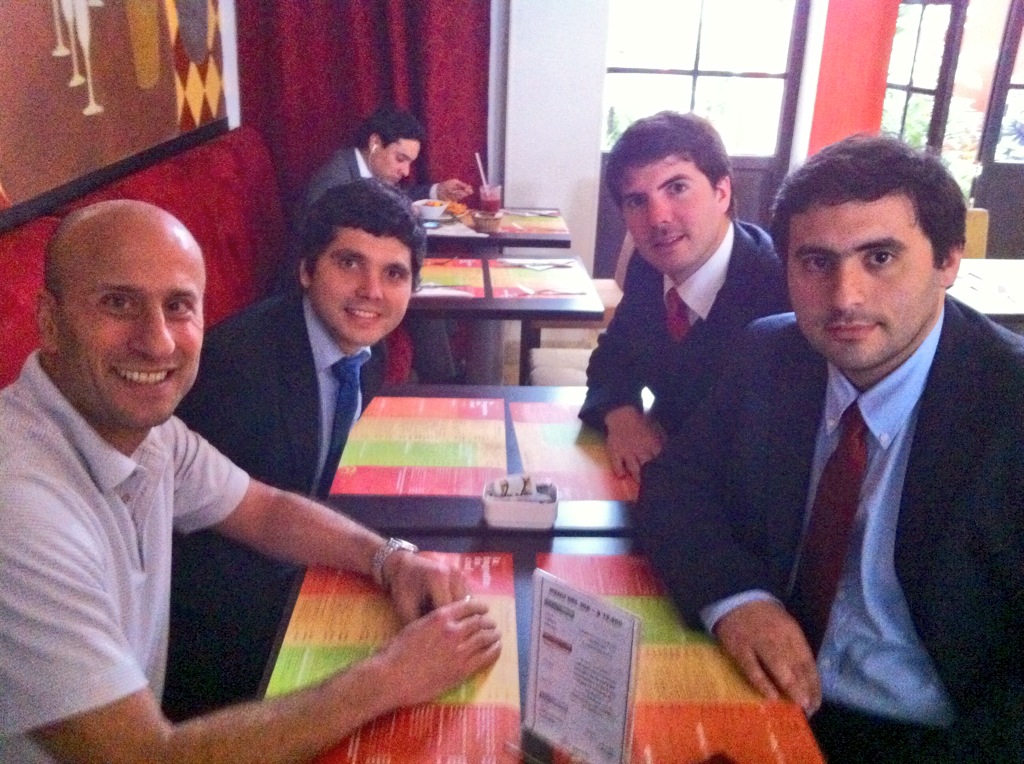On thinking bigger and executing “smaller”
Yesterday was a fun-filled day of meeting with the startups that are starting the 14 month program at the accelerator where I’m Program Director. This cohort of companies seems to be filled with founders who are passionate about what they are doing and interested in giving it their all. This makes all the difference, in my mind, not only in terms of their chances for building great businesses, but in terms of the joy and interest in help guide them in any way I can. I noticed, along the way, that I was offering my feedback on their long term vision while pushing for short term results (more on that later).
Also, I was delighted to meet the founders of a very interesting educational startup from Chile called Puntaje Nacional (see photo). These founders have a startup which seems to be killing it in Chile and is now looking to expand to Colombia. One of the metrics I remember is that of 450k users. Also, any of the startups I usually speak with in Latin America would be happy to have their revenues (won’t divulge number ’cause I didn’t ask permission) and the growth opportunities they have in front of them.
In the evening, I had the opportunity to meet with an amazing person who has created startups and products in Silicon Valley for several years. He is extremely well tapped into the investment and startup ecosystem in the valley and is interested in working with Latin America because of his roots. It was really great to hear his ideas and his vision about how to get things going. I felt like his plan was quite a bit more ambitious than my own and I liked it and he was just an the conversation was extremely stimulating. Note to self: I need to write about the impressive people I met this year.
I actually get quite excited with startups that are able to execute and achieve some type of traction. That’s why I’m so psyched about companies that I advise such as Tappsi and Magnolia. Their businesses may be similar to other international startups and companies, but I just feel that they have solid teams and were able to take their startup from idea to a company with growing metrics (e.g., users, sales, etc.) and this is something I don’t see often down here (much more prevalent in the states).
Thus, as I mentioned in the first paragraph, I find myself, more and more, asking startups to test their assumptions as early as possible. In some cases (not all), this actually means selling. If their assumptions seem sound and they seem that they have the potential to build a big business (I say “seem” because us “experts” can’t know for sure – I usually have degrees of skepticism and share these), then I’m much more interested in seeing them get to their first US $1000 than theorizing about their first million.
When business assumptions just don’t seem to make sense either from an operational point of view (e.g., few resources for such a large amount of fronts, etc.) or from a competitive point of view, I just try to get the founder to understand what she or he is betting upon. If they are making unrealistic assumptions, I’m just happy if I’m able to make them conscious of this and have them test these out as quickly as possible. I also look up to guys such as Paul Graham who take this role to whole other level and fill me with tons of insecurity in the process. 
I remember three years ago, when I sat in on Adeo Ressi’s sessions with founders pitching their ideas. Adeo is someone who has created several companies and has heard thousands upon thousands of pitches. I was in shock at the speed and precision with which he was able to offer his feedback and it was great learning experience. Now, after three years of running the Founder Institute here in Colombia as well as guiding three cohorts of companies at my current accelerator, I must say that I can feel the difference at executing this role.
It’s a strange position that I’ve put myself in at this point in my life (adviser, guide, etc.). I remember when I always used to be the youngest guy in the room; now I’m almost always the oldest. If I am effective (you never know), I think it comes from my respect and admiration for these founders (even when I think they’re bonkers – especially then). I may not agree with a founder, but I respect them for taking the plunge and also for their tenaciousness . That’s what makes this ride so enjoyable for me. 

